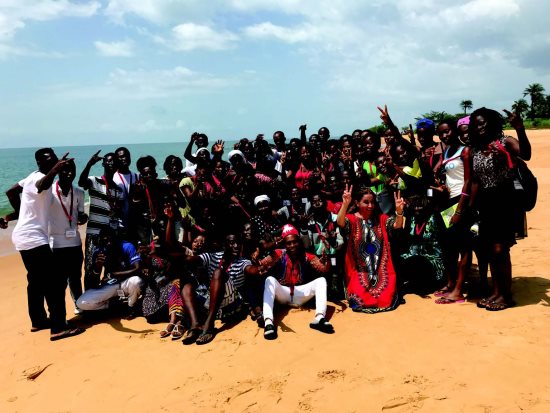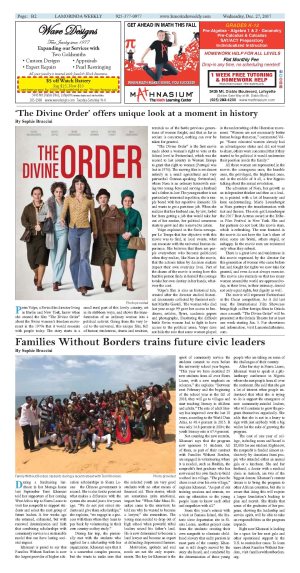| | Published December 27th, 2017
| Families Without Borders trains future civic leaders
| | | By Sophie Braccini |  | | Family Without Borders students during a recent retreat with Terri Khonsari. Photo provided |
During a fundraising luncheon in her Moraga home last September Terri Khonsari told her supporters of her coming West Africa trip to Sierra Leone to visit her nonprofit to support students and select the next group of future leaders. A few weeks ago she returned, exhausted, but with renewed determination and faith that combining scholarships with community service is a sustainable model that can have lasting societal impact.
 Khonsari is proud to say that Families Without Borders is now the largest provider of higher education scholarships in Sierra Leone - the Chinese government is second. She is also fast to point out what makes a difference with the system she created just a few years ago. "We do not just select students and give them scholarships," she explains, "we engage in a process with them where they learn to pay back by volunteering in their own country as they study."
Khonsari is proud to say that Families Without Borders is now the largest provider of higher education scholarships in Sierra Leone - the Chinese government is second. She is also fast to point out what makes a difference with the system she created just a few years ago. "We do not just select students and give them scholarships," she explains, "we engage in a process with them where they learn to pay back by volunteering in their own country as they study."
 During her trip, she personally met with the students who applied for a scholarship with her organization. Khonsari says that it is a somewhat complex process, but she wants to make sure that the selected youth are very good students with no other means of financial aid. Their stories, which are sometimes quite emotional, impact her. "When Sahr Musa Biankoe came to the interview, he told me why he wanted to become a lawyer," she remembers. The young man needed to drop out of high school when powerful tribal leaders seized his father's land. He is now determined to become a land lawyer and become an expert at defending dispossessed farmers.
During her trip, she personally met with the students who applied for a scholarship with her organization. Khonsari says that it is a somewhat complex process, but she wants to make sure that the selected youth are very good students with no other means of financial aid. Their stories, which are sometimes quite emotional, impact her. "When Sahr Musa Biankoe came to the interview, he told me why he wanted to become a lawyer," she remembers. The young man needed to drop out of high school when powerful tribal leaders seized his father's land. He is now determined to become a land lawyer and become an expert at defending dispossessed farmers.
 Motivation, aptitude and real needs are not the only requirements. The key for Khonsari is the spirit of community service the students commit to even before the university school year begins. "This year we have recruited 25 new students from all over Sierra Leone, with a new emphasis on sciences," she explains. "Between next February and the beginning of the school year in the fall of 2018, they will go to villages and start teaching literacy to children and adults." The rate of adult literacy has improved over the last 10 years, according to the World Data Atlas, to 48.4 percent in 2015. It was only 34.8 percent in 2004; the youth literacy rate is 67.4 percent.
Motivation, aptitude and real needs are not the only requirements. The key for Khonsari is the spirit of community service the students commit to even before the university school year begins. "This year we have recruited 25 new students from all over Sierra Leone, with a new emphasis on sciences," she explains. "Between next February and the beginning of the school year in the fall of 2018, they will go to villages and start teaching literacy to children and adults." The rate of adult literacy has improved over the last 10 years, according to the World Data Atlas, to 48.4 percent in 2015. It was only 34.8 percent in 2004; the youth literacy rate is 67.4 percent.
 Not counting the new recruits, Khonsari says that the program now sponsors 51 students. All of them, as part of their contract with Families Without Borders, are engaged in volunteering where it is needed, such as Ibrahim, the nonprofit's first graduate who has now raised his own funds to build a school in a village. "The place he chose is not even his own village," explains Khonsari. "As part of our training sessions and retreats, we mix up ethnicities so the young people learn to know each other and empathize with all."
Not counting the new recruits, Khonsari says that the program now sponsors 51 students. All of them, as part of their contract with Families Without Borders, are engaged in volunteering where it is needed, such as Ibrahim, the nonprofit's first graduate who has now raised his own funds to build a school in a village. "The place he chose is not even his own village," explains Khonsari. "As part of our training sessions and retreats, we mix up ethnicities so the young people learn to know each other and empathize with all."
 From this year's retreat with a visit at Banana Island, the historic slave deportation site in Sierra Leone, another project came from the students: creating their own nonprofit to eliminate childhood slavery that sadly persists in most parts of the country. Khonsari is still deeply moved by the story she heard, and comforted by the determination of these young people who are taking on some of the challenges of their country.
From this year's retreat with a visit at Banana Island, the historic slave deportation site in Sierra Leone, another project came from the students: creating their own nonprofit to eliminate childhood slavery that sadly persists in most parts of the country. Khonsari is still deeply moved by the story she heard, and comforted by the determination of these young people who are taking on some of the challenges of their country.
 After her stay in Sierra Leone, Khonsari went to speak at a philanthropy conference in Nigeria where she met people from all over the continent. She said that she got a lot of interest when people understood that what she is trying to do is support the emergence of new community-minded leaders, who will continue to grow the program themselves organically. She adds that she is not in a hurry to sign with just anybody with a big wallet for the sake of growing the program.
After her stay in Sierra Leone, Khonsari went to speak at a philanthropy conference in Nigeria where she met people from all over the continent. She said that she got a lot of interest when people understood that what she is trying to do is support the emergence of new community-minded leaders, who will continue to grow the program themselves organically. She adds that she is not in a hurry to sign with just anybody with a big wallet for the sake of growing the program.
 The cost of one year of college, including room and board is $2,000 for one student. Right now, the nonprofit is funded almost exclusively by donations from people who attended either an annual gala or a luncheon. She and her husband, a doctor with a medical clinic in Antioch, are two of the biggest donors. Khonsari's current dream is to bring the program to other African countries, but she is aware that doing this will require a larger foundation's backing to plan and recruit. She thinks that some of the graduates of her program, showing the leadership and service spirit, will be able to take on responsibilities as the program expands.
The cost of one year of college, including room and board is $2,000 for one student. Right now, the nonprofit is funded almost exclusively by donations from people who attended either an annual gala or a luncheon. She and her husband, a doctor with a medical clinic in Antioch, are two of the biggest donors. Khonsari's current dream is to bring the program to other African countries, but she is aware that doing this will require a larger foundation's backing to plan and recruit. She thinks that some of the graduates of her program, showing the leadership and service spirit, will be able to take on responsibilities as the program expands.
 Right now Khonsari is looking for a space for her next gala and other operational support in the U.S. to sustain her cause. To learn more about Families Without Borders, visit www.familieswithoutborders.org.
Right now Khonsari is looking for a space for her next gala and other operational support in the U.S. to sustain her cause. To learn more about Families Without Borders, visit www.familieswithoutborders.org.

|
| | | | | | | | | | | | |



